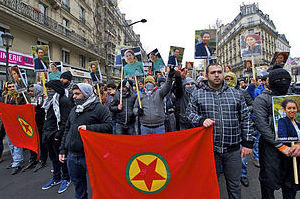What the Columnists Say
Etyen Mahçupyan in Akşam writes that the cease-fire ended because PKK started to seek independence in Rojawa, and because Turkey did not want to have a PKK state at its border. “PKK has shot itself in the foot,” he writes. Metin Münir on the t24 news site finds it incredible that PKK chose to respond to Erdoğan’s restart of the war in what he describes as the most stupid way possible, by returning to terrorism. Orhan Bursalı in Cumhuriyet writes that PKK is laying the ground for secession from Turkey. Kemal Öztürk in Yeni Şafak warns the AKP that the party is losing the public relation battle to PKK among the Kurds, and that yet another electoral disaster is looming. Şahin Alpay in Zaman writes that even though Erdoğan is the chief responsible for why calm and stability continue to elude Turkey, the fundamental reasons for this are inscribed in the genetic code of the republic.

Mahçupyan: PKK shot itself in the foot
Etyen Mahçupyan in Akşam writes that PKK has shot itself in the foot. At a point where it had the chance to force Turkey to a real peace, it seriously damaged its legitimacy by returning to war. Those who want to lend support to the Kurdish political movement now claim that Erdoğan has started the war because he could not become executive president or because he wants an election victory. These speculations are all baseless. The presidency is not part of the events, because a presidential system can only be introduced together with a new constitution, and even if were to come to power alone the AKP could not propose such a constitution by its own, because it would not be able to ensure the necessary legitimacy and permanency of the endeavor. Nor is there any logic behind the speculation about starting a war in order to win the election; because if such a perception has been established, you are not going to win an election anyway. Besides, if this is indeed the AKP’s purpose, then you’ll need to find an answer to why the PKK helped the AKP by executing those two police officers. So why did the cease-fire end? It ended because the PKK started to seek independence in Rojava, and because Turkey did not want to have a PKK state at its border. One should not forget that a PKK that establishes itself as a state means that there will be civil war in Turkey anyway. The AKP is not opposed to a Kurdish entity by its border; such an entity can even serve its purposes. But it is against every form of autonomy that is imposed by PKK. Thus, it did not hesitate to exploit the PKK’s serious mistake and reciprocated the invitation to end the cease-fire.
Münir: PKK chose the most stupid answer to Erdogan
Metin Münir on the t24 news site writes that Erdoğan, after tasting his first election defeat, turned his ire and hate against HDP and its leaders. He ended the solution process. He sent the air force to bomb Kandil. PKK, the target of this attack, had many choices; without hesitation, the PKK chose the most stupid one. It started to spread terror. Maybe the leaders of the PKK, like all other aging warlords, could not accept that they are no longer in tune with the times, maybe they could not bring themselves to accept that the time has come for them to leave the initiative to the civilians. Whatever Erdoğan does, the most rational thing for the PKK to do is to pull out its warriors from Turkey and concentrate on the fight against ISIS.
Bursali: the Kurds are breaking away from Turkey
Orhan Bursalı in Cumhuriyet calls attention to a statement made by Kurdish leader Cemil Bayık: “No one can force us to pull out the guerilla from the north (from Turkey) or force us to lay down our arms. These are things that are never going to happen.” The leaders of the PKK/KCK have embraced the opportunity that has been offered them in Syrian Kurdistan; they are strengthening their positions there (through the PYD and with the help of the U.S. and the West); the focus of their policies is primarily to view Southeastern and Eastern Anatolia as forming one unit together with Syrian Kurdistan. The proclamations of “self-rule” in two provinces and six counties are not only a result of the [Turkish air force] bombings [of Kandil]; this is something for which they have prepared for a long time. The proclamations of Kurdish “self-rules” are one step: the message is “We don’t recognize the central government in Ankara.” They speak of “Revolutionary people’s war.” This means that we can expect smaller and bigger uprisings with the participation of the masses. It appears that the PKK/KCK has opted for policies that break off the bonds with Turkey.
Erdoğan’s War: The Causes and Consequences of the Upsurge in Kurdish Violence
By Gareth Jenkins (vol. 8, no. 15 of the Turkey Analyst)
In recent weeks, Turkey has been wracked by an escalation in Kurdish-related violence. Not only could the upsurge have been prevented but there are fears that the worst may yet be to come. The fear is that President Recep Tayyip Erdoğan may order an even harsher crackdown over the weeks ahead and that, with its rural units depleted by deployments to Iraq and Syria, the PKK may increasingly respond by staging attacks, including more suicide car bombings, in the cities.




